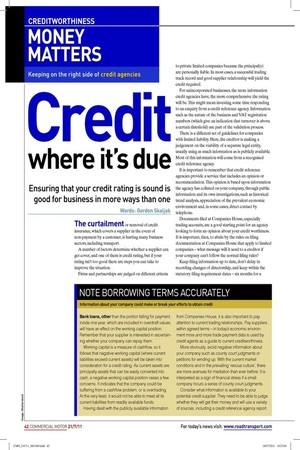where it’s due
Page 37

Page 38

If you've noticed an error in this article please click here to report it so we can fix it.
Ensuring that your credit rating is sound is good for business in more ways than one
Words: Gordon Skaljak The curtailment or removal of credit insurance, which covers a supplier in the event of non-payment by a customer, is hurting many business sectors, including transport.
A number of factors determine whether a supplier can get cover, and one of them is credit rating, but if your rating isn’t too good there are steps you can take to improve the situation.
Firms and partnerships are judged on different criteria to private limited companies because the principal(s) are personally liable. In most cases, a successful trading track record and good supplier relationship will yield the credit required.
For unincorporated businesses, the more information credit agencies have, the more comprehensive the rating will be. This might mean investing some time responding to an enquiry from a credit reference agency. Information such as the nature of the business and VAT registration numbers (which give an indication that turnover is above a certain threshold) are part of the validation process.
There is a different set of guidelines for companies with limited liability. Here, the creditor is making a judgement on the viability of a separate legal entity, usually using as much information as is publicly available. Most of this information will come from a recognised credit reference agency.
It is important to remember that credit reference agencies provide a service that includes an opinion or recommendation. This opinion is based upon information the agency has collated on your company, through public information and its own investigations, such as historical trend analysis, appreciation of the prevalent economic environment and, in some cases, direct contact by telephone.
Documents iled at Companies House, especially trading accounts, are a good starting point for an agency looking to form an opinion about your credit worthiness. It is important, then, to abide by the rules on iling documentation at Companies House that apply to limited companies – what message will it send to a creditor if your company can’t follow the normal iling rules?
Keep iling information up to date, don’t delay in recording changes of directorship, and keep within the statutory iling requirement dates – six months for a Public Limited Company and nine months for private limited businesses.
Accounts iled at Companies House also provide information that can be used to make a credit opinion, particularly for limited companies. And while all credit agencies have their own formula for arriving at a rating, there are certain fundamental principles.
Key indicators
Current iling requirements are fairly minimal for small/ medium companies, but the data provides key indicators on a company’s performance. The bottom line – a company’s net worth – is always signiicant. Businesses should always keep the net worth positive because negative net worth is a hazard to ratings. Similarly, movements in net worth will affect the credit rating. File proit and loss accounts, so that any downward movements in the net worth can be seen to be drawings or losses. If there are no other explanations, the natural assumption is that a negative impact on the net worth of a company is due to losses. However, a drop in the value of a proit and loss account can also be caused by dividends that exceed the proit for the year being taken out.
Another tactic is to retain some proit in the business, thereby increasing the net worth each year. This shows that more is being retained and invested in the business, and gives a favourable prospect for a good credit rating.
Look at share capital – how much have you invested in your own business when you are expecting suppliers to grant credit on unsecured terms? How much credit would you offer a company where the shareholders are prepared to put only two £1 shares at risk? Have you, as a director or shareholder, loaned the company money that you have no intention of redeeming? Consider capitalising the loan – this will increase the net worth and most likely have a positive effect on the credit rating. ■














































